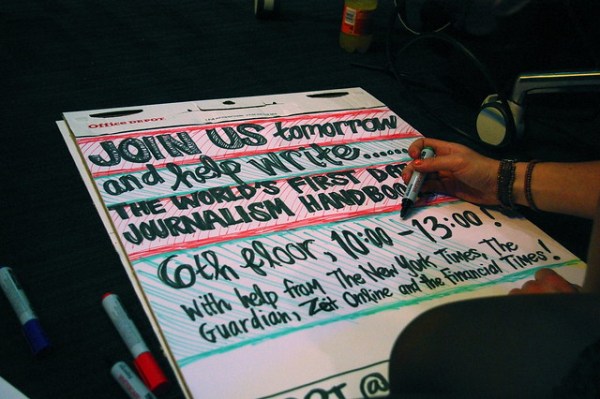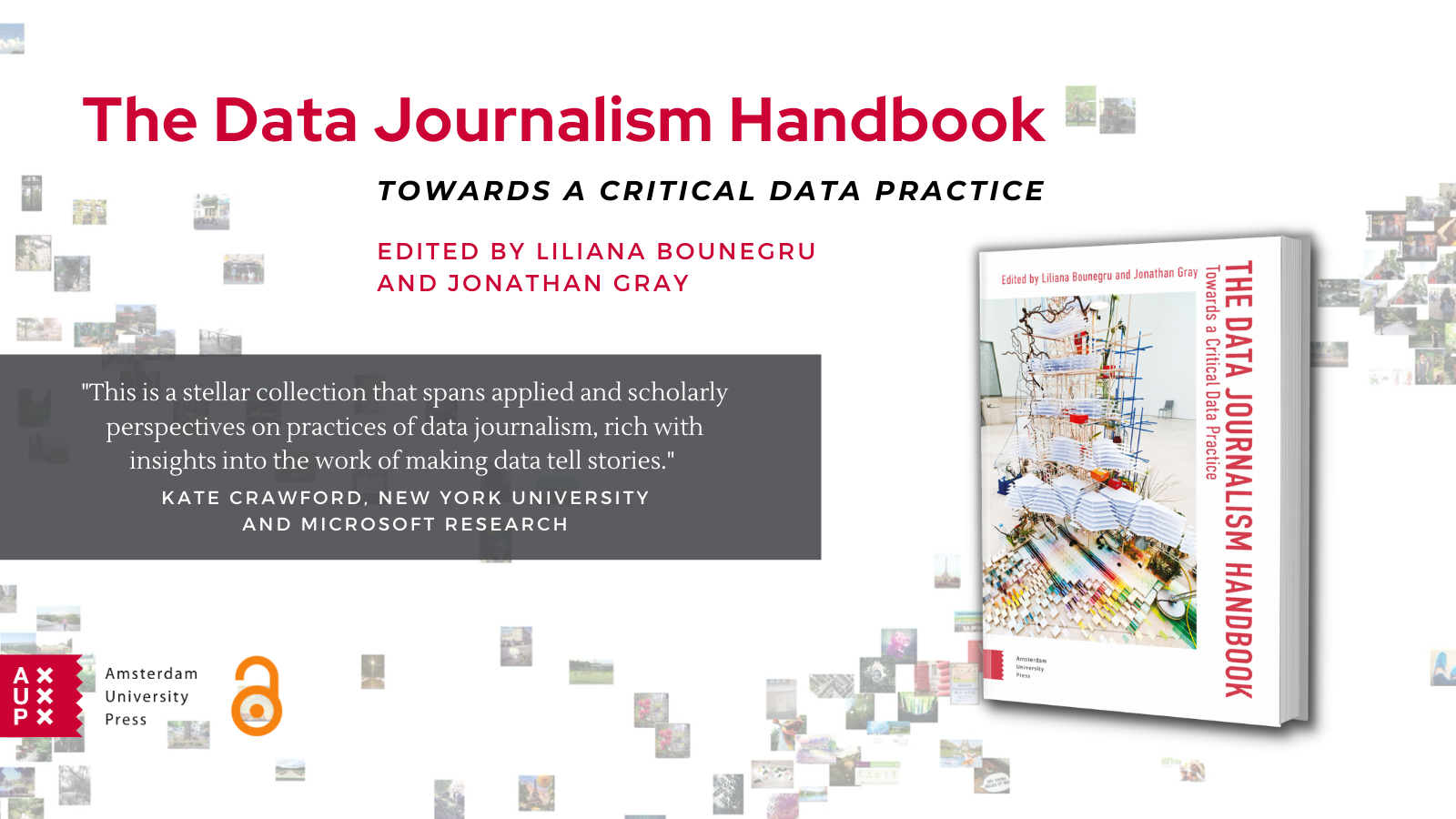This blog is cross-posted from lilianabounegru.org. Further details can be found in this thread.
Today The Data Journalism Handbook: Towards a Critical Data Practice (which I co-edited with Jonathan Gray) is published on Amsterdam University Press. It is published as part of a new book series on Digital Studies which is also being launched today. You can find the book here, including an open access version: http://bit.ly/data-journalism-handbook-2
The book provides a wide-ranging collection of perspectives on how data journalism is done around the world. It is published a decade after the first edition (available in 14 languages) began life as a collaborative draft at the Mozilla Festival 2011 in London.

The new edition, with 54 chapters from 74 leading researchers and practitioners of data journalism, gives a “behind the scenes” look at the social lives of datasets, data infrastructures, and data stories in newsrooms, media organizations, startups, civil society organizations and beyond.
The book includes chapters by leading researchers around the world and from practitioners at organisations including Al Jazeera, BBC, BuzzFeed News, Der Spiegel, eldiario.es, The Engine Room, Global Witness, Google News Lab, Guardian, the International Consortium of Investigative Journalists (ICIJ), La Nacion, NOS, OjoPúblico, Rappler, United Nations Development Programme and the Washington Post.
An online preview of various chapters from book was launched in collaboration with the European Journalism Centre and the Google News Initiative and can be found here.
The book draws on over a decade of professional and academic experience engaging with the field of data journalism, including through my role as Data Journalism Programme Lead at the European Journalism Centre; my research on data journalism with the Digital Methods Initiative; my PhD research on “news devices” at the universities of Groningen and Ghent; and my research, teaching and collaborations around data journalism at the Department of Digital Humanities at King’s College London.
Further background about the book can be found in our introduction. Following is the full table of contents and some quotes about the book. We’ll be organising various activities around the book in coming months, which you can follow with the #ddjbook hashtag on Twitter.
If you adopt the book for a class we’d love to hear from you so we can keep track of how it is being used (and also update this list of data journalism courses and programmes around the world) and to inform future activities in this area. Hope you enjoy it!
Table of contents
Introduction – Jonathan Gray and Liliana Bounegru
Doing Issues With Data
- From Cofffee to Colonialism: Data Investigations Into How the Poor Feed the Rich – Raúl Sánchez and Ximena Villagrán
- Repurposing Census Data to Measure Segregation in the United States – Aaron Williams
- Multiplying Memories while Discovering Trees in Bogotá – María Isabel Magaña
- Behind the Numbers: Home Demolitions in Occupied East Jerusalem – Mohammed Haddad
- Mapping Crash Incidents to Advocate for Road Safety in the Philippines – Aika Rey
- Tracking Worker Deaths in Turkey – Pınar Dağ
Assembling Data
- Building Your Own Data Set: Documenting Knife Crime in the United Kingdom – Caelainn Barr
- Narrating a Number and Staying With the Trouble of Value – Helen Verran
- Indigenous Data Sovereignty: Implications for Data Journalism – Tahu Kukutai and Maggie Walter
- Alternative Data Practices in China – Yolanda Jinxin Ma
- Making a Database to Document Land Conflicts Across India –Kumar Sambhav Shrivastava and Ankur Paliwal
- Reassembling Public Data in Cuba: Collaborations When Information Is Missing, Outdated or Scarce – Saimi Reyes Carmona, Yudivián Almeida Cruz and Ernesto Guerra
- Making Data With Readers at La Nación – Flor Coelho
- Running Surveys for Investigations – Crina-Gabriela Boroş
Working With Data
- Data Journalism: What’s Feminism Got to Do With I.T.? – Catherine D’Ignazio
- Infrastructuring Collaborations Around the Panama and Paradise Papers – Emilia Díaz-Struck, Cécile Schilis-Gallego and Pierre Romera
- Text as Data: Finding Stories in Text Collections – Barbara Maseda
- Coding With Data in the Newsroom – Basile Simon
- Accounting for Methods: Spreadsheets, Scripts and Programming Notebooks – Sam Leon
- Working Openly in Data Journalism –Natalia Mazotte
- Making Algorithms Work for Reporting – Jonathan Stray
- Journalism With Machines? From Computational Thinking to Distributed Cognition – Eddy Borges-Rey
Experiencing Data
- Ways of Doing Data Journalism – Sarah Cohen
- Data Visualizations: Newsroom Trends and Everyday Engagements – Helen Kennedy, William Allen, Martin Engebretsen, Rosemary Lucy Hill, Andy Kirk and Wibke Weber
- Sketching With Data – Mona Chalabi and Jonathan Gray
- The Web as Medium for Data Visualization – Elliot Bentley
- Four Recent Developments in News Graphics – Gregor Aisch and Lisa Charlotte Rost
- Searchable Databases as a Journalistic Product – Zara Rahman and Stefan Wehrmeyer
- Narrating Water Conflict With Data and Interactive Comics – Nelly Luna Amancio
- Data Journalism Should Focus on People and Stories – Winny de Jong
Investigating Data, Platforms and Algorithms
- The Algorithms Beat: Angles and Methods for Investigation – Nicholas Diakopoulos
- Telling Stories With the Social Web – Lam Thuy Vo
- Digital Forensics: Repurposing Google Analytics IDs- Richard Rogers
- Apps and Their Afffordances for Data Investigations – Esther Weltevrede
- Algorithms in the Spotlight: Collaborative Investigations at Der Spiegel – Christina Elmer
Organizing Data Journalism
- The #ddj Hashtag on Twitter – Eunice Au and Marc Smith
- Archiving Data Journalism – Meredith Broussard
- From The Guardian to Google News Lab: A Decade of Working
in Data Journalism – Simon Rogers - Data Journalism’s Ties With Civic Tech – Stefan Baack
- Open-Source Coding Practices in Data Journalism – Ryan Pitts and Lindsay Muscato
- Data Feudalism: How Platforms Shape Cross-border Investigative Networks – Ştefan Cândea
- Data-Driven Editorial? Considerations for Working With Audience Metrics – Caitlin Petre
Learning Data Journalism Together
- Data Journalism, Digital Universalism and Innovation in the Periphery – Anita Say Chan
- The Datafication of Journalism: Strategies for Data-Driven Storytelling and Industry–Academy Collaboration – Damian Radclifffe and Seth C. Lewis
- Data Journalism by, about and for Marginalized Communities – Eva Constantaras
- Teaching Data Journalism – Cheryl Phillips
- Organizing Data Projects With Women and Minorities in Latin America – Eliana A. Vaca Muñoz
Situating Data Journalism
- Genealogies of Data Journalism – C. W. Anderson
- Data-Driven Gold Standards: What the Field Values as Award-Worthy Data Journalism – Wiebke Loosen
- Beyond Clicks and Shares: How and Why to Measure the Impact of Data Journalism Projects – Lindsay Green-Barber
- Data Journalism: In Whose Interests? – Mary Lynn Young and Candis Callison
- Data Journalism With Impact – Paul Bradshaw
- What Is Data Journalism For? Cash, Clicks, and Cut and Trys – Nikki Usher
- Data Journalism and Digital Liberalism – Dominic Boyer
Quotes about the book
“This stimulating new book offers researchers and journalists alike the welcome chance to reflect critically on how important new uses of quantification are inspiring what has become known as data journalism. The variety of voices, data, and examples are revelatory.” – Wendy Espeland, Northwestern University; co-author of Engines of Anxiety: Academic Rankings, Reputation, and Accountability
“It is now established that data is entangled with politics and embedded in history and society. This bountiful book highlights the crucial role of data journalists as users and critics of data, and in facilitating public engagement and discussion around it.” – Emmanuel Didier, Ecole normale supérieure and author of America by the Numbers: Quantification, Democracy, and the Birth of National Statistics
“Profound and practical, this sparkling collection engages the topic of data journalism with rich insights into the nature of numbers in the news.” – Geoffrey C. Bowker, University of California, Irvine; co-author of Sorting Things Out: Classification and Its Consequences and author of Memory Practices in the Sciences
“This book is an impressive feat. Bounegru and Gray have put together a truly global and diverse collection that greatly enriches our understanding of the politics of data and what it means for journalism. In the wake of the Covid-19 pandemic, this contribution is more important than ever.” – Lina Dencik, co-founder of the Data Justice Lab, Cardiff University; co-author of Digital Citizenship in a Datafied Society
“Ostensibly focused on data journalism, this handbook is so much more, providing an overarching analysis of much of the emerging field of critical data studies. Journalists and others interested in how to assemble, work with, make sense of, apply, and critically reflect on data and their uses will revel in the extensive theoretical and practical insights.” – Rob Kitchin, Maynooth University; author of The Data Revolution: Big Data, Open Data, Data Infrastructures and Their Consequences
“The Data Journalism Handbook is an indispensable resource for students, researchers, and journalists who want to understand how data are translated into information, information in knowledge and, ultimately, wisdom. That itinerary all starts with a full comprehension of how data reflect, construct and shape our social reality.” – José van Dijck, Utrecht University; author of The Culture of Connectivity and The Platform Society
“The variety, diversity, and depth of the contributions to this collective effort make this book a required reading for beginners and professionals alike.” – Alberto Cairo, University of Miami; author of How Charts Lie: Getting Smarter About Visual Information
“This magical multitudinous book is an experiment that will shape the future of critical data journalism.” – Celia Lury, University of Warwick; author of Problem Spaces: How and Why Methodology Matters and co-editor of Inventive Methods: The Happening of the Social
“By providing a wealth of living testimonies from practitioners and academics from different countries, this book gives a rich overview of practices that have become key in contemporary journalism. The main virtue of this book is to give a set of practical insights to help journalists not only to better cooperate with their peers but also to establish more fruitful relationships with researchers and publics.” – Sylvain Parasie, Sciences Po; author of Sociologie d’internet
“This wide-ranging and thoughtfully curated volume is an essential companion for researchers and practitioners who seek to rethink what data can mean for themselves and their audiences.” – Yanni A. Loukissas, Georgia Tech; author of All Data Are Local: Thinking Critically in a Data-Driven Society
“An intelligent and cutting-edge entry-point to the field of data journalism, sure to become an essential part of curricula and research around this topic.” – Anja Bechmann, Director of DATALAB, Aarhus University
